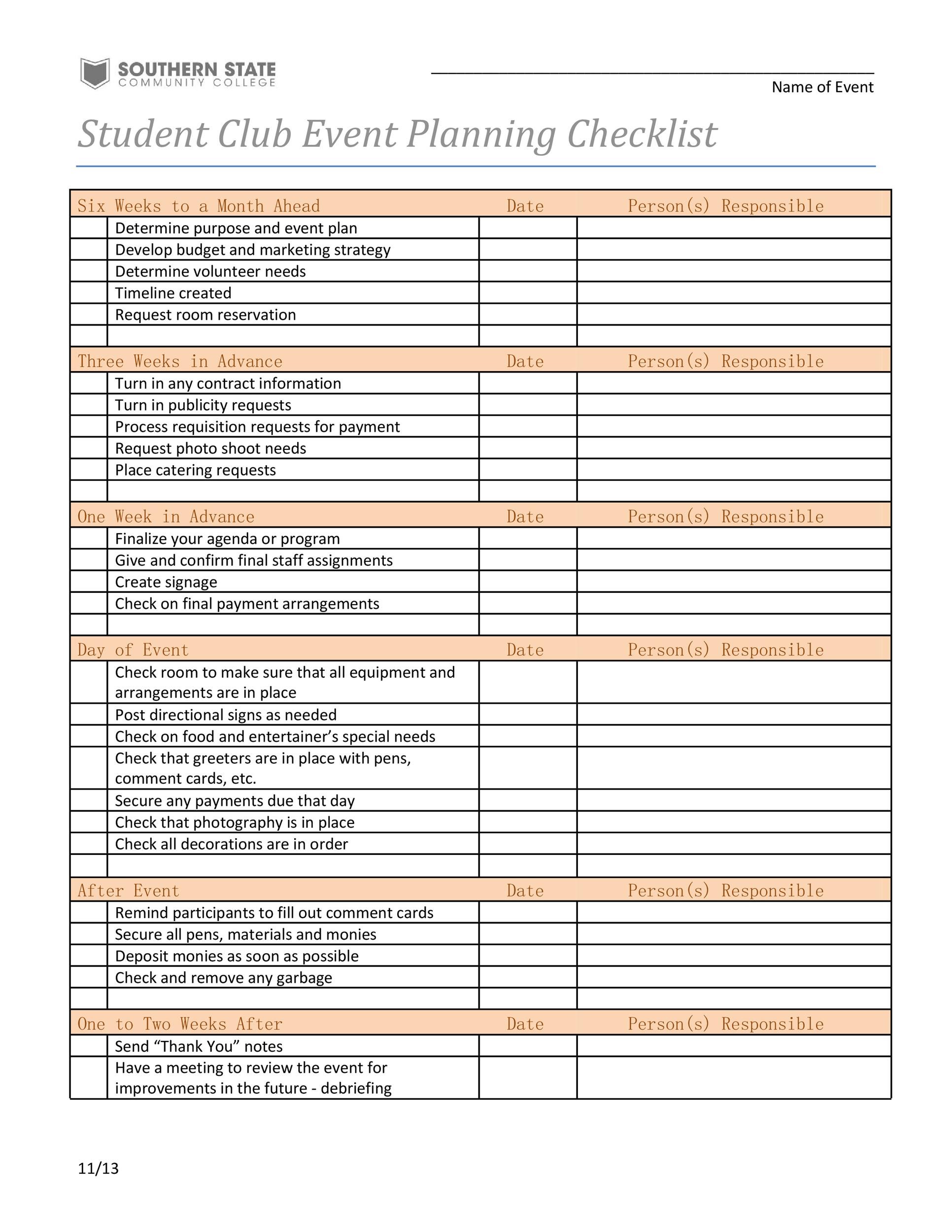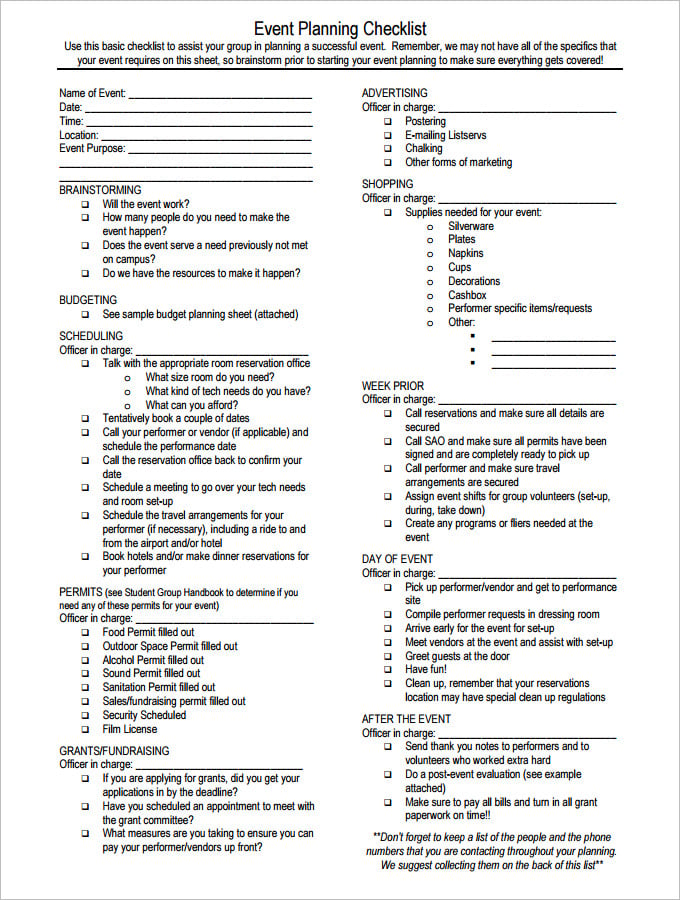
Planning an event can be a daunting task, whether it’s a small gathering or a large-scale conference. There are so many details to consider and it’s easy to feel overwhelmed. That’s why having a comprehensive event planning checklist is essential.
This guide will walk you through the entire event planning process, from start to finish, ensuring that no detail is overlooked and that your event is a resounding success.
1. Setting Goals and Objectives
Before diving into the logistical details of planning an event, it’s important to first establish your goals and objectives. What is the purpose of the event? What do you hope to achieve? By clearly defining your goals, you can tailor your event planning efforts to meet those objectives.
Some common goals for events include:
- Networking: Creating opportunities for attendees to connect and build relationships.
- Education: Providing valuable information and learning experiences for participants.
- Entertainment: Offering a fun experience for guests.
- Fundraising: Raising money for a cause or organization.
- Brand Awareness: Increasing visibility and promoting your brand or company.
Once you have determined your goals, you can move on to the next step in the event planning checklist.
2. Defining the Target Audience
Knowing your target audience is crucial for planning a successful event. By understanding who your attendees are, you can tailor the event to their needs and preferences. Consider factors such as age, gender, interests, and profession when defining your target audience.
For example, if you are planning a conference for healthcare professionals, you would want to include relevant speakers and topics that would be of interest to that audience. On the other hand, if you are organizing a music festival targeting young adults, you would focus on booking popular bands and creating a vibrant atmosphere.
Understanding your target audience will help you make informed decisions throughout the planning process.
3. Budgeting and Financial Planning
One of the most important aspects of event planning is budgeting. Without a clear budget, it’s easy for costs to spiral out of control. Start by determining how much you are willing to spend on the event and allocate funds to different areas such as venue rental, catering, marketing, and entertainment.
Consider all potential expenses, including hidden costs such as permits and insurance. It’s also a good idea to set aside a contingency fund for unexpected expenses that may arise.
Tracking expenses throughout the planning process will help you stay within budget and avoid any financial surprises.
4. Selecting the Perfect Venue
The venue plays a crucial role in the success of your event. It sets the tone and atmosphere and should be chosen with your target audience and goals in mind. Consider factors such as location, capacity, amenities, and accessibility when selecting a venue.
Depending on the type of event, you may need to book the venue well in advance to ensure availability. It’s also important to visit the venue in person to ensure it meets your requirements and to discuss any specific needs or requests with the venue staff.
Remember to consider any additional services the venue may offer, such as catering or audiovisual equipment, as this can save you time and effort in sourcing these services separately.
5. Creating a Detailed Schedule and Timeline
A well-planned schedule and timeline are vital for keeping your event on track. Start by outlining the main activities and key moments of the event, such as registration, keynote speeches, breakout sessions, and networking breaks.
Next, create a detailed timeline that includes the start and end times of each activity, as well as any setup and teardown requirements. This will help you ensure that everything runs smoothly and that there is enough time for each element of the event.
Share the schedule and timeline with your team and any relevant vendors or partners to ensure everyone is on the same page.
6. Securing Vendors and Suppliers
Depending on the scale of your event, you may need to work with various vendors and suppliers to bring your vision to life. This could include caterers, audiovisual technicians, decorators, and transportation providers, among others.
When selecting vendors, consider factors such as reputation, experience, and cost. Request quotes and proposals from multiple vendors to ensure you are getting the best value for your money.
Once you have chosen your vendors, make sure to communicate your needs and expectations clearly, and confirm all details in writing. A good working relationship with your vendors will contribute to the success of your event.
7. Marketing and Promotion
No event can be successful without attendees, so it’s important to invest time and effort into marketing and promotion. Start by creating a marketing plan that outlines your target audience, key messages, and promotional channels.
Utilize both online and offline marketing strategies to reach your audience. This could include social media promotion, email marketing, targeted advertising, and traditional marketing methods such as print ads or flyers.
Consider partnering with influencers or industry experts who can help spread the word about your event. Offer early bird discounts or special incentives to encourage early registration.
8. On-Site Management and Execution
On the day of the event, it’s crucial to have a well-organized team in place to ensure everything runs smoothly. Assign specific roles and responsibilities to team members and provide them with clear instructions and timelines.
Have a designated point of contact for vendors and suppliers to coordinate logistics and troubleshoot any issues that may arise.
Make sure to conduct a final walkthrough of the venue before the event starts to ensure everything is set up correctly and to address any last-minute details.
During the event, be prepared to handle any unexpected situations and provide excellent customer service to attendees.




Final Words
Planning an event can be challenging, but with a well-organized event planning checklist, you can ensure that no detail is overlooked and that your event is a success. By setting clear goals, understanding your target audience, budgeting effectively, and following a detailed timeline, you can create a memorable and impactful event that leaves a lasting impression. Remember to stay organized, communicate clearly with your team and vendors, and be prepared to adapt and problem-solve along the way. With careful planning and execution, your event will be one to remember.
Event Planning Checklist Template Word – Download